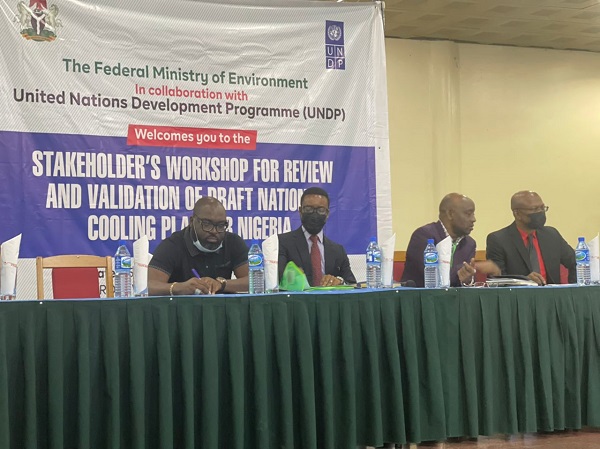…Saves 0.5°c of average temperature rise

The Federal Ministry of Environment has revealed plans to adopt new ozone and climate-friendly technologies to improve energy efficiency of cooling appliances and adoption of minimum energy performance standards for refrigerators and air conditioning equipment.
The Minister of Environment, Barr. Mohammed Abdullahi made this known during a stakeholder’s workshop for validation of the draft National Cooling Plan (NCP) today (May 25, 2022) in Abuja.
He noted that the draft NCP is an output of the Kigali Cooling Efficiency Programme (KCEP) approved for Nigeria in 2018 by the Climate Works Foundation. The project is being implemented by United Nations Development Programme (UNDP) in collaboration with the Ministry of Environment.
Also, Abdullahi said with rising global temperatures and increasingly severe heatwaves, most of the world’s population is vulnerable to the growing health risks of extreme heat; cooling is critical for human wellbeing, health, agriculture and many more applications.
He noted that despite the rising global temperatures and population, most developing countries continue to install more cooling equipment, air conditioners and refrigerators using refrigerants with high Ozone-depletion potential such as hydrochlorofluorocarbons (HCFCs) and refrigerants with high global warming potential, such as hydrofluorocarbons (HFCs), thereby causing the depletion of the Ozone layer and emissions of greenhouse gases, respectively.
The minister stressed that the Montreal Protocol which is the treaty at the heart of the issues of refrigerants for cooling was greed by parties in 1987 to address the existential threat of stratospheric ozone depletion. Nigeria signed the protocol in 1988 and ratified all its amendments, including the Kigali Amendment, which was signed by the president in 2018.
“Under the amendment, the global use of hydrofluorocarbons (HFCs) will be reduced by around 85 per cent before 2050. This phase down in the global consumption of HFCs could save as much as 0.5°c of average global temperature rise. The implementation of the Kigali Amendment provisions will provide us with an unprecedented opportunity to adopt new ozone as well as climate-friendly technologies, improve the energy efficiency of cooling appliances and adoption of minimum energy performance standards for refrigerators and air conditioning equipment,” he said
Abdullahi added that the regulation of the cooling sector is important to complement global efforts toward the preservation of the Ozone layer and reduction of greenhouse gas emissions, to help the nation achieve her targets under the Montreal Protocol, Kigali Amendment and the Paris Climate Agreement of keeping global temperatures well below 2 degrees centigrade.
The minister said the draft National Cooling Plan provides the pathway for the country’s transition to reduce GHGs emissions through the enforcement of energy efficiency (EE) requirements and the phase-down of high global warming potential (GWP) refrigerants which will lead to affordable access to cooling for the Nigerian population and also contribute to meeting Nigeria’s Sustainable Development Goals (SDGs) and economic development targets.
In his remarks, the programme manager, UNDP, Oladipo Osibo, added that from 2023, HCFCs would not be allowed in the country, as there would be replacements for them.
“We started with TFCs to HCFCs and, now, we have moved to HCFs. Nigeria has committed itself [and] one of the milestones is Jan 1, 2023, when some of these substances will not be allowed into the country anymore. Before that time, what the Federal Ministry of Environment is trying to do is to make sure that the alternative is available because you cannot ban something when people don’t have alternatives; which is why we do most of these programmes.
“The idea is to put replacements in place before Jan 1, 2023, which is why we have the Customs so that if you are trying to import them, it can be stopped.”

